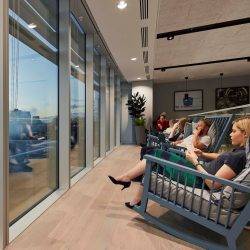February 14, 2017
UK cyber workforce grows 160 percent in five years, new report claims 0
 The UK ‘cyber workforce’ has grown by 160 percent in the five years to 2016, according to new Tech Partnership research. Around 58,000 people now work in cyber security, up from 22,000 in 2011, and they command an average salary of over £57,000 a year – 15 percent higher than tech specialists as a whole, and up 7 percent on last year. Just under half of the cyber workforce is employed in the digital industries, while banking accounts for one in five, and the public sector for 12 percent. The figures, derived from analysis of bespoke data from IT Jobs Watch and supporting information from the Office of National Statistics’ Quarterly Labour Force Survey, are published in the Tech Partnership’s most recent Fact Sheet, Cyber Security Specialists in the UK.
The UK ‘cyber workforce’ has grown by 160 percent in the five years to 2016, according to new Tech Partnership research. Around 58,000 people now work in cyber security, up from 22,000 in 2011, and they command an average salary of over £57,000 a year – 15 percent higher than tech specialists as a whole, and up 7 percent on last year. Just under half of the cyber workforce is employed in the digital industries, while banking accounts for one in five, and the public sector for 12 percent. The figures, derived from analysis of bespoke data from IT Jobs Watch and supporting information from the Office of National Statistics’ Quarterly Labour Force Survey, are published in the Tech Partnership’s most recent Fact Sheet, Cyber Security Specialists in the UK.














 Amos Tversky and Daniel Kahneman introduced the concept of Loss Aversion in 1984, highlighting people’s tendency to strongly prefer avoiding losses to acquiring gains. Most studies suggest that losses are twice as powerful, psychologically, as gains. Lose £100 and we will feel a remorse that easily outweighs winning £100. In a similar fashion we find it very hard to see future positives when confronted with short term loses. We understand easily what we have lost but cannot imagine what there is to be gained. Furthermore, as Frederic Bastiat wrote in an 1850 paper, “That Which is Seen, and That Which is Not Seen”, man has a tendency to “pursue a small present good, which will be followed by a great evil to come, rather than a great good to come, at the risk of a small present evil”. Put these together and it is no wonder that, by and large, the future of work, corporate real estate and the workplace is so widely misunderstood.
Amos Tversky and Daniel Kahneman introduced the concept of Loss Aversion in 1984, highlighting people’s tendency to strongly prefer avoiding losses to acquiring gains. Most studies suggest that losses are twice as powerful, psychologically, as gains. Lose £100 and we will feel a remorse that easily outweighs winning £100. In a similar fashion we find it very hard to see future positives when confronted with short term loses. We understand easily what we have lost but cannot imagine what there is to be gained. Furthermore, as Frederic Bastiat wrote in an 1850 paper, “That Which is Seen, and That Which is Not Seen”, man has a tendency to “pursue a small present good, which will be followed by a great evil to come, rather than a great good to come, at the risk of a small present evil”. Put these together and it is no wonder that, by and large, the future of work, corporate real estate and the workplace is so widely misunderstood.




















